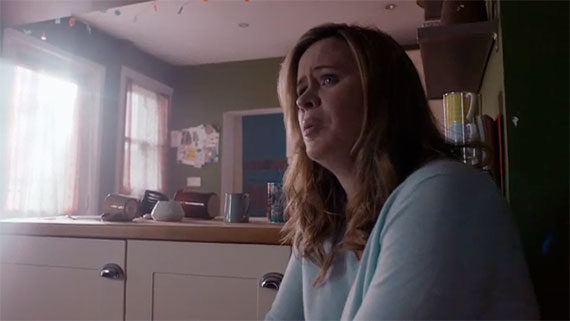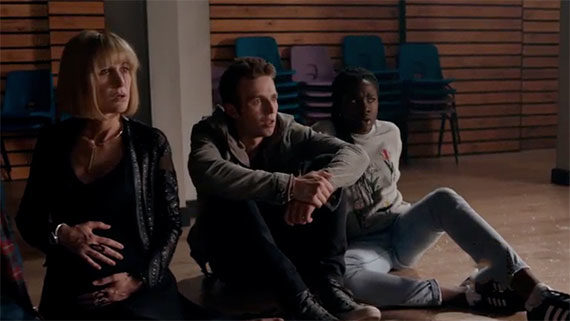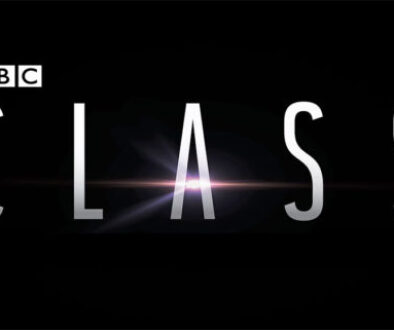Class: Episode 8 “The Lost” Review
Clint Hassell gives his verdict on the finale of Doctor Who’s new spin-off.

Note: this review contains full spoilers for the eighth episode, available on BBC3 now.
Ostensibly, a great finale resolves the series’ major conflicts, completes the character arcs of the main cast, and generates interest in further episodes, all while making a final, definitive statement about the series’ overall theme. In “The Lost,” writer Patrick Ness accomplishes much of this successfully, delivering a finale that not only addresses the necessary narrative requirements, but does so in unexpected ways, shaded by the writer’s personal agenda, that inform Class’ ultimate message.
Primarily, “The Lost” settles Class’ major plotline of the savage Shadow Kin, who, having previously destroyed Charlie and Quill’s homeworld of Rhodia, now threaten to invade the pair’s new planet of asylum, Earth. However, rather than merely rely on Charlie using the cabinet of souls to defeat Corakinus and his soldiers – – a move so telegraphed as to be unsurprising – – writer Patrick Ness pushes the boundaries of a young adult series by places the emphasis on Class’ teen characters deciding to commit genocide. It is unfortunate that Ram, who has watched the brutal murder of his girlfriend and his father, is the first to suggest using the cabinet of souls to defeat the Shadow Kin, as it makes the impulsive Ram’s wishes seem vengeful. In fact, he argues a valid point: that the Shadow Kin will continue killing until they are stopped. “There is no help! We either sacrifice our families or we sacrifice each other. How is there even an answer to that?” April counters, asking Ram if they are any better for killing Corakinus, presenting the traditional argument. For Ram to say, “yes,” and to do so defiantly, is a mature departure for the series, and sets Class apart from Doctor Who and The Sarah Jane Adventures, where, so often, the narrative is twisted to impossible extremes in order for the protagonists to not use lethal force. Considering the stakes raised by the return of Corakinus as king of the Shadow Kin, the deaths of Varun and Vivian, and the invasion of Earth, any course of action other than the use of the cabinet of souls is inane, and for characters to still make the argument otherwise is juvenile.

By writing the cast into this particular no-win predicament, Patrick Ness almost defends their actions. The complete destruction of the entire Shadow Kin populace is portrayed not as “justifiable,” but as necessary, lest Charlie and company become complacent in the Shadow Kin scourging the Earth as they had Rhodia. Additionally, note how Ness uses his characters’ distinctive voices to bolster his argument, as Charlie and April, the two characters most prone to timidity and self-doubt, embody the more traditional, pacifist philosophy; in the end, Charlie kills April, in order to defeat his enemy. Further, it is especially poignant that Tanya – – chronologically the youngest, though ostensibly the most mature, after the death of her father – – voices the episode’s most persuasive, final argument:
“And I have to choose [Charlie and April’s safety] over my mom? Over my brothers? . . . There are no other ways! We tried other ways, and they come back! We tried other ways, and people die! How am I the only one who see this? . . . I may have been 14 when we started this, but I am 100 years-old, now, and I am telling you, it is time to use the cabinet of souls.”

Ness’ personal agenda also colors the series’ final statement on whether or not the Rhodian custom of Arn-enforced punishment constitutes just penance or slavery. In two seemingly unrelated scenes, Class pointedly demonstrates that neither Charlie nor Miss Quill know what to do with their hands when being hugged by another person, an interesting way to parallel that the two are both alien, and more alike than either wants to admit. Consider that the scene of Charlie struggling to comfort April cuts directly to a shot of Charlie sitting at Quill’s bedside. Is he worried for her health because they are the last of their kind, because he feels ineffectual in not knowing how to help her, or because he worries for his safety, should she awaken? For Ness’ slavery allegory to be effective, the audience must see that Charlie is compassionate, and has the capacity to be a great leader; otherwise, they lose sight of the fact that Charlie truly does consider Quill’s punishment to be a just alternative to death. Though in the final act, Ness draws a pretty decisive comparison between Charlie and Quill both having “to live with the sacrifice” required by their actions – – a line that solidifies their intertwined character arcs – – for Ness to make such a pervasive argument on both sides demonstrates that the situation is complicated and worthy of continued debate.

Will Class find a platform for further discussion? “The Lost” certainly endeavors to generate interest in a second series by leaving several plot threads unresolved and including a cameo by an iconic monster from Who lore. It is here, however, that Ness’ personal background is most evident, and unfortunately, it is to the episode’s detriment. Ness, who lived in the United States until he was 28, constructed “The Lost” more like an American “season” finale – – i.e., merely a break in a longer storyline – – and less like a British “series” finale, which could serve as a satisfying conclusion to the narrative, should no further episodes be commissioned. As it stands, “The Lost” leaves too many logistical questions unanswered, and several characters see little resolution to their character arc. Did Charlie decide to use the cabinet of souls to end the loneliness of being separated from his people, to become a hero, or as self-punishment for killing April? Each answers vastly changes the resolution of his storyline. Considering what has happened to Ram, how can he be anything but psychologically damaged beyond repair? Who will care for Tanya and her brothers, now that they are orphans? How will she react to her mother’s death, once the adrenaline of the world’s shortest, silliest training montage subsides? And what of April?
Overall, Class is a remarkably efficient, seldom-rushed, eight-episode series; however, in trying to generate compelling interest in a second series, Ness’ script for “The Lost” feels irresolute. Such a dense narrative needed a proper epilogue, a ninth episode, or (hopefully) a second series to answer the overall question of “what happens now?”








